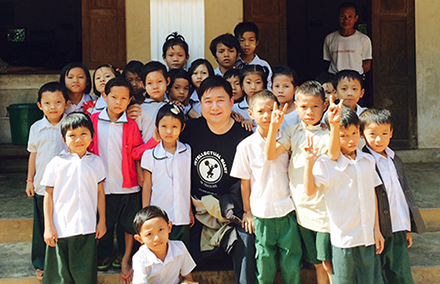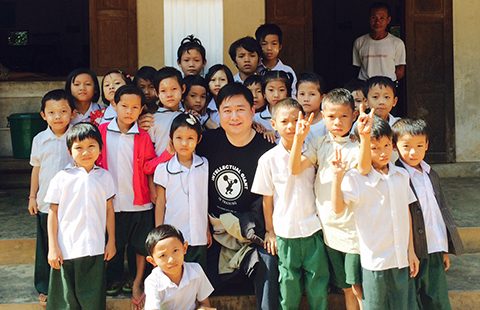
ANUMSA president Chit Win with primary school students in Myanmar. Photo supplied.
ANU students witness and contribute to Myanmar’s social and political developments.
Last week, fellow students from the Australian National University and I visited two villages in Myanmar’s Ayeyarwaddy Region to deliver stationery to primary school children. The trip also provided an opportunity to witness how the grassroots has responded to Myanmar’s political and economic transformations.
The trip was organised by the ANU Myanmar Students’ Association (ANUMSA) – an increasingly active student body thanks to a growing number of students from Myanmar as well as students whose research focuses on Myanmar’s political and societal changes. It isn’t the only charitable work the group has undertaken of late.
When disastrous floods affecting half the country hit Myanmar hard in August last year, ANUMSA promptly responded by organising seminars on disaster management and raising A$ 6,000 — which we delivered to four of the five affected areas in Myanmar. This trip was also made to give the remaining proceeds in person.
Through a local network in Ayeyarwaddy Region, we managed to find two primary schools that would receive our donations. Thin Pyie Oo, a public policy student and a recipient of a prestigious Australia Award Scholarship explained her experience with local volunteers.
“They were very much committed to the development of their communities. They know how to reconcile the donor’s intentions and local needs,” she said.
From a donor’s perspective, ANUMSA was satisfied with the level of co-operation and accountability we received from local volunteers.
Before we arrived at our destination, we were intrigued by how locals engaged in community development. We met Zaw Win, our fixer in Pathein. He is a local development worker highly respected by the regional government. He told me how he and his partners worked hard during the flood disaster.
“We couldn’t wait for government assistance. We had to rely on ourselves. But we were able to convince the government to allow us to use its facilities, including warehouses, boats and so on. We developed a working relationship and confidence with the local government.”
We arrived at Thayet Kone and Thayet Cho Kone villages around noon. These two villages are adjacent to each other. One is predominantly a Kayin Buddhist village and the other is a Kayin Christian village. I saw Kayin flags in every household as locals had just celebrated Kayin New Year.
Located in Pathein Township about 10 kilometres off the Ngwe Saung-Pathein Road, a few years ago both villages were inaccessible by car or even by motorbike. People had to walk across muddy farmlands for hours.
Kyi Kyi Win, another volunteer and former teacher, told me that thanks to the constituency development fund provided by the parliament, villagers had developed a gravel road connecting the villages. She laughingly recounted how all the villagers voted for the political party that sponsored the project. During the flooding, the bridge was washed away and I saw local villagers constructing it again. The election was over and apparently it was back to self-reliance.
The Christian villagers hosted lunch at their church. We also had to be aware of local politics and, therefore, paid our respect to monks in the Buddhist village and ate what they had prepared. Thagyi, or village chief, Than Htwe made sure that we complied with their customs.
He is a village-tract administrator overseeing eight Kayin villages, but his tenure is about to finish. He told me how villagers these days were better-informed thanks to mobile communications. He was delighted when one of the primary school children told us that he wanted to become Thagyi like him when he grew up.
Our presence attracted more attention than the usual donation ceremony. We delivered school bags, lunch boxes and stationery to over 120 students from the villages’ two primary schools. We tried to mingle with the children but we were overwhelmed by their questions. Ye Yint, an undergraduate student and a presidential scholarship recipient, was bombarded “What language do they speak in Australia?” “Do they like playing football?” “What are you doing there?” “Why can’t you study in Myanmar?”
Some children asked more serious questions; “Why are we poor?” Some of them had not seen a pencil sharpener in their life! The teachers tried to impress us by arranging a talent show. Su Su Lin, a graduate student whose background is public health, showed the children how to wash their hands properly and how to eat healthily.
Our trip was a snapshot of Myanmar’s transformation. We saw a surge of homegrown domestic assistance and how it compared with international help. There were important take home lessons. Local networks are increasingly accountable when engaging with donors. Local governments are becoming responsive to community calls but are still under various constraints.
We also saw patterns of patron-client relationships but at the end of the day, it is all about self-reliance. We saw development as a way to bind the people together. And we witnessed all this because we decided to go to the field by ourselves and deliver the assistance.
Thank you to all the students and friends of Myanmar from Australia for their support. We encourage everyone to go to the grassroots level to realise how Myanmar has changed.
Chit Win is a PhD student from ANU Coral Bell School of Asia Pacific Affairs. He is also the President of the ANU Myanmar Students’ Association (ANUMSA). On 11 January 2016 he led a trip to Ayeyarwaddy Region to deliver donations collected by ANUMSA in the aftermath of floods in Myanmar in August 2015.
 Facebook
Facebook  Twitter
Twitter  Soundcloud
Soundcloud  Youtube
Youtube  Rss
Rss 